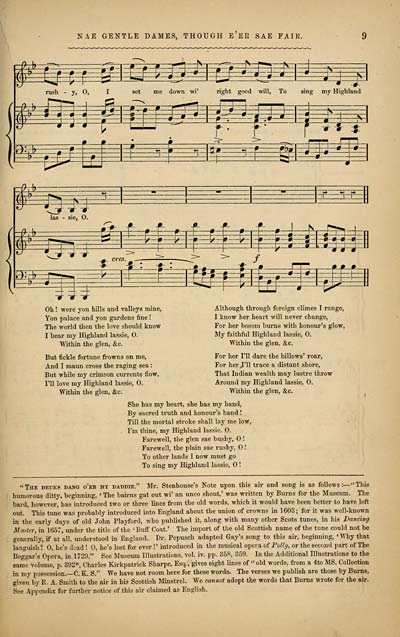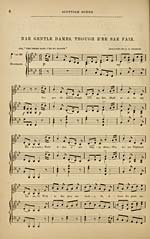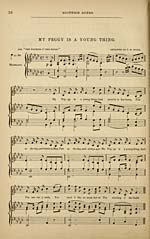Inglis Collection of printed music > Printed music > Songs of Scotland adapted to their appropriate melodies > Volume 3
(21) Page 9
Download files
Complete book:
Individual page:
Thumbnail gallery: Grid view | List view

NAE GENTLE DAMES, THOUGH E EI! SAE FAIK.
±=S^
t & ^ftttt&ttf-tfm*
rush - y, O,
set me down wi'
right good will, To sing my Highland
m^$
*r-
a
mm
^jf i QjJJ^t^^^
-F— l- P--
<■ m-m-m
g i C-, ■rp j
-* -4~ -*
Oh ! were yon hills and valleys mine,
Yon palace and yon gardens fine !
The world then the love should know
I bear my Highland lassie, 0.
Within the glen, &c.
But fickle fortune frowns on me,
And 1 maun cross the raging sea :
But while my crimson currents flow,
I'll love my Highland lassie, 0.
Within the glen, &c.
«3=*
pn
Although through foreign climes I range,
I know her heart will never change,
For her bosom burns with honour's glow,
My faithful Highland lassie, 0.
Within the glen, &c.
For her I'll dare the billows' roar,
For her J'll trace a distant shore,
That Indian wealth may lustre throw
Around my Highland lassie, 0.
Within the glen, &c.
She has my heart, she has my hand,
By sacred truth and honour's band !
Till the mortal stroke shall lay me low,
I'm thine, my Highland lassie, 0.
Farewell, the glen sae bushy, !
Farewell, the plain sae rushy, !
To other lands I now must go
To sing my Highland lassie, !
"The deuks dang o'eb my daddie." Mr. Stenhouse's Note upon this air and song is as follows :— " This
humorous ditty, beginning, ' The bairns gat out wi' an unco shout,' was written by Burns for the Museum. The
bard, however, has introduced two or three lines from the old words, which it would have been better to have left
out. This tune was probably introduced into England about the union of crowns in 1603 ; for it was well-known
in the early days of old John Playford, who published it, along with many other Scots tunes, in his Dancing
Matter, in 1G57, under the title of the 'Buff Coat.' The import of the old Scottish name of the tune could not be
generally, if at all, understood in England. Dr. Pepusch adapted Gay's song to this air, beginning, 'Why that
languish ? 0, he's dead ! 0, he's lost for ever ! ' introduced in the musical opera of Polly, or the second part of The
Beggars Opera, in 1729." See Museum Illustrations, vol. iv. pp. 358, 359. In the Additional Illustrations to the
same volume, p. 392*, Charles Kirkpatrick Sharpe, Esq., gives eight lines of " old words, from a 4to MS. Collection
in my possession.— C. K. 8." We have not room here for these words. The verses we publish are those by Burns,
given by R. A. Smith to the air in his Scottish Minstrel. We cannot adopt the words that Burns wrote for the air.
See Appendix for further notice of this air claimed as English.
±=S^
t & ^ftttt&ttf-tfm*
rush - y, O,
set me down wi'
right good will, To sing my Highland
m^$
*r-
a
mm
^jf i QjJJ^t^^^
-F— l- P--
<■ m-m-m
g i C-, ■rp j
-* -4~ -*
Oh ! were yon hills and valleys mine,
Yon palace and yon gardens fine !
The world then the love should know
I bear my Highland lassie, 0.
Within the glen, &c.
But fickle fortune frowns on me,
And 1 maun cross the raging sea :
But while my crimson currents flow,
I'll love my Highland lassie, 0.
Within the glen, &c.
«3=*
pn
Although through foreign climes I range,
I know her heart will never change,
For her bosom burns with honour's glow,
My faithful Highland lassie, 0.
Within the glen, &c.
For her I'll dare the billows' roar,
For her J'll trace a distant shore,
That Indian wealth may lustre throw
Around my Highland lassie, 0.
Within the glen, &c.
She has my heart, she has my hand,
By sacred truth and honour's band !
Till the mortal stroke shall lay me low,
I'm thine, my Highland lassie, 0.
Farewell, the glen sae bushy, !
Farewell, the plain sae rushy, !
To other lands I now must go
To sing my Highland lassie, !
"The deuks dang o'eb my daddie." Mr. Stenhouse's Note upon this air and song is as follows :— " This
humorous ditty, beginning, ' The bairns gat out wi' an unco shout,' was written by Burns for the Museum. The
bard, however, has introduced two or three lines from the old words, which it would have been better to have left
out. This tune was probably introduced into England about the union of crowns in 1603 ; for it was well-known
in the early days of old John Playford, who published it, along with many other Scots tunes, in his Dancing
Matter, in 1G57, under the title of the 'Buff Coat.' The import of the old Scottish name of the tune could not be
generally, if at all, understood in England. Dr. Pepusch adapted Gay's song to this air, beginning, 'Why that
languish ? 0, he's dead ! 0, he's lost for ever ! ' introduced in the musical opera of Polly, or the second part of The
Beggars Opera, in 1729." See Museum Illustrations, vol. iv. pp. 358, 359. In the Additional Illustrations to the
same volume, p. 392*, Charles Kirkpatrick Sharpe, Esq., gives eight lines of " old words, from a 4to MS. Collection
in my possession.— C. K. 8." We have not room here for these words. The verses we publish are those by Burns,
given by R. A. Smith to the air in his Scottish Minstrel. We cannot adopt the words that Burns wrote for the air.
See Appendix for further notice of this air claimed as English.
Set display mode to: Large image | Transcription
Images and transcriptions on this page, including medium image downloads, may be used under the Creative Commons Attribution 4.0 International Licence unless otherwise stated. ![]()
| Special collections of printed music > Inglis Collection of printed music > Printed music > Songs of Scotland adapted to their appropriate melodies > Volume 3 > (21) Page 9 |
|---|
| Permanent URL | https://digital.nls.uk/94711840 |
|---|
| Shelfmark | Ing.129 |
|---|---|
| Additional NLS resources: | |
| Attribution and copyright: |
|
| Description | Scottish and English songs, military music and keyboard music of the 18th and 19th centuries. These items are from the collection of Alexander Wood Inglis of Glencorse (1854 to 1929). Also includes a few manuscripts, some treatises and other books on the subject. |
|---|
| Description | The Glen Collection and the Inglis Collection represent mainly 18th and 19th century Scottish music, including Scottish songs. The collections of Berlioz and Verdi collected by bibliographer Cecil Hopkinson contain contemporary and later editions of the works of the two composers Berlioz and Verdi. |
|---|

